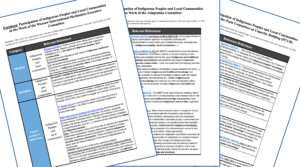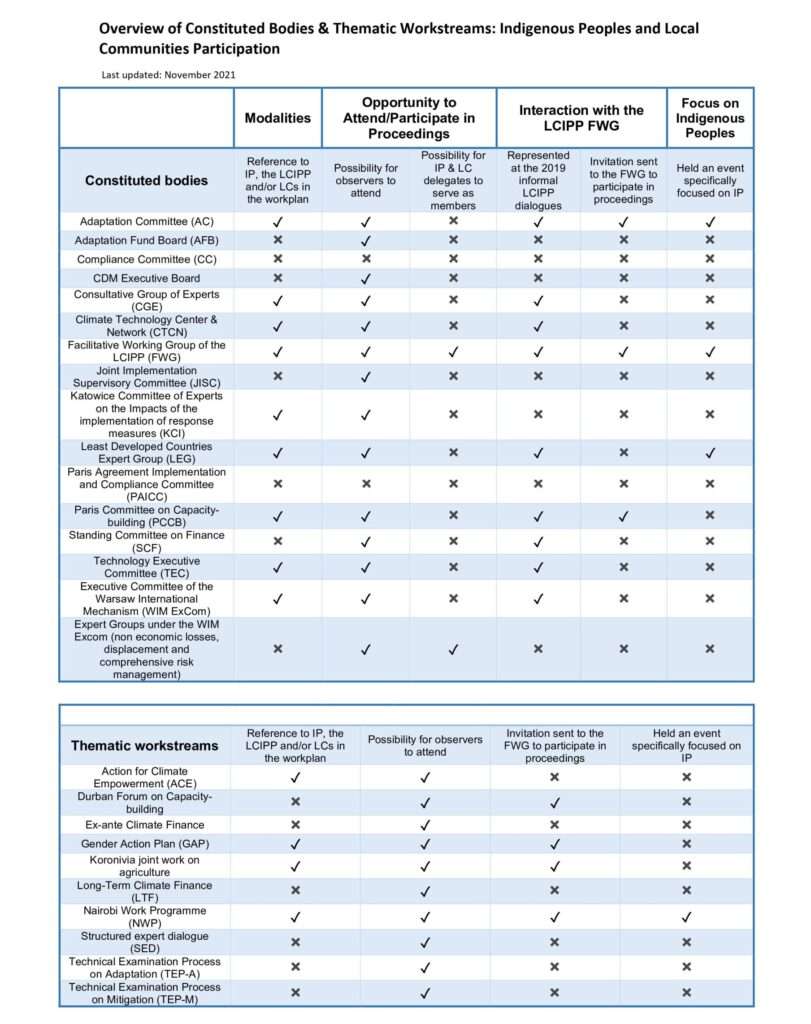
Indigenous Peoples have been warning about the climate crisis and combating false solutions to climate change for decades. Their advocacy has been instrumental in getting governments to adopt more ambitious climate policies. Many Indigenous representatives advocate for a human rights-based approach to these policies — an approach that respects, protects, and fulfills the United Nations Declaration on the Rights of Indigenous Peoples (UNDRIP), including principles such as free, prior, and informed consent. The impact of this work is evident in the preamble to the Paris Agreement and has shaped the outcomes of many other UN climate processes to ensure that climate action takes human rights into account and contributes to the protection of healthy ecosystems. Indigenous leadership, the value of traditional knowledge, and the importance of guaranteeing the rights of Indigenous Peoples to participate in climate-related decision-making is reflected in many decisions adopted under the UN climate agreements on issues as diverse as agriculture, climate finance, action to combat deforestation, and loss and damage (for more details, see the compilation of all references to Indigenous Peoples and traditional knowledge in UNFCCC decisions, and its 2020 update).
Ensuring the effective participation of Indigenous Peoples in constituted bodies and thematic workstreams established under the UN climate agreements is critical to the effective implementation of the UN Framework Convention on Climate Change (UNFCCC) and the Paris Agreement. Under their human rights obligations, States also have the obligation to promote the effective and meaningful participation of Indigenous Peoples at all levels of climate governance, including in relevant UN processes. However, the modalities and practices of most bodies established under the UN climate agreements provide, at best, limited opportunities for the participation of Indigenous Peoples’ representatives. To support the promotion of better practices and more inclusive modalities for Indigenous Peoples participation in these bodies and processes, CIEL compiled 25 fact sheets mapping references to Indigenous Peoples and local communities in work plans, modalities, terms of reference, and rules of procedure, as well as technical papers and annual, workshop, and event reports related to each of the constituted bodies and thematic workstreams established under the UNFCCC and the Paris Agreement.
These fact sheets are available below. A short methodology note for these fact sheets will be made available here shortly.
These resources are meant to complement the work undertaken under Activity 7 of the initial two-year work plan of the Local Communities and Indigenous Peoples Platform’s (LCIPP) Facilitative Working Group with regards to the mapping of practices, gaps, and opportunities for improved participation of Indigenous Peoples and local communities.
Fact sheets related to the participation of Indigenous Peoples and local communities in UNFCCC constituted bodies:
- Adaptation Committee (AC)
- Adaptation Fund Board (AFB)
- Compliance Committee (CC)
- Clean Development Mechanism Executive Board (CDM EB)
- Consultative Group of Experts (CGE)
- Climate Technology Center & Network (CTCN)
- Facilitative Working Group of the LCIPP (FWG)
- Joint Implementation Supervisory Committee (JISC)
- Katowice Committee of Experts on the Impacts of the Implementation of Response Measures (KCI)
- Least Developed Countries Expert Group (LEG)
- Paris Agreement Implementation and Compliance Committee (PAICC)
- Paris Committee on Capacity-Building (PCCB)
- Standing Committee on Finance (SCF)
- Technology Executive Committee (TEC)
- Executive Committee of the Warsaw International Mechanism (WIM ExCom)
Fact sheets related to the participation of Indigenous Peoples and local communities in UNFCCC thematic workstreams:
- Action for Climate Empowerment (ACE)
- Durban Forum on Capacity-Building
- Ex-ante Climate Finance post 2020 (article 9.5 of the Paris Agreement)
- Gender Action Plan (GAP)
- Koronivia Joint Work on Agriculture
- Long-Term Climate Finance (LTF)
- Nairobi Work Programme (NWP)
- Structured Expert Dialogue (SED)
- Technical Examination Process on Adaptation (TEP-A)
- Technical Examination Process on Mitigation (TEP-M)
Published in October 2021.

